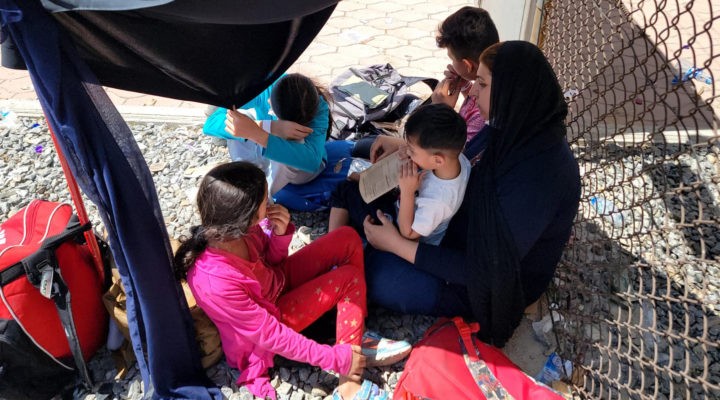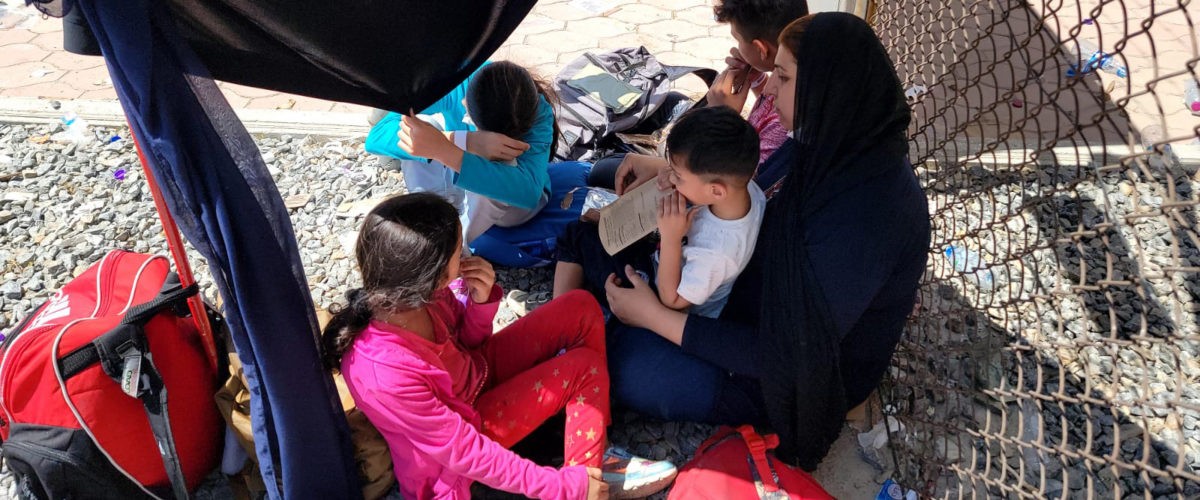Mustafa Aria, 14, escaped from terror-torn Afghanistan with his family just days ago, airlifted by the United States military from Kabul to Qatar to Germany and then by United Airlines to Washington, D.C.
On Sunday, after grueling days at the Kabul airport gates and then in transit, he was in a music store in Virginia cradling his new piano, the American-style variation of his cherished harmonium left behind in Afghanistan when his family escaped with only the clothes on their back.
His father, Wais Aria, knew the family was in grave danger, since the nonprofit organization he founded, TABISH, had been rehabilitating youth soldiers to recover from psychological trauma from war ravaging the country for years. The family had been visiting in Afghanistan and feared they would not be able to return to their home in Virginia.
Mustafa and his three siblings — 10-year-old Sara, 7-year-old Safa, and 4-year-old Mubshir — were taken by their father to the Kabul airport in the midst of chaos. Their mother, Kubra, hid their Green Card papers, Mubshir’s American passport, and her cell phone under her clothes, knowing the Taliban would not touch women — considered sacrilegious — nor are there any female soldiers who would frisk.
“We showed them our papers, but they couldn’t read anyway. Some people showed any papers, even a driver’s license.”
“I was beaten many times on my shoulders by the Taliban who kept pushing us back as we waited hours to get close to the gate,” Wais Aria recounted. “We showed them our papers, but they couldn’t read anyway. Some people showed any papers, even a driver’s license.”
Back in U.S., on Sunday, Aug. 29, Aria took his children to the local shopping mall, to “keep them busy” and get them ice cream. “I asked my 4-year-old if he wanted french fries, but he said, ‘No daddy, I don’t want anything,” Aria said.
He took them to Ross for school clothes. “My daughter said, ‘No daddy, I don’t want anything.’”
He bought them shoes and a school bag with his credit card, but there’s no money left in the bank account. At least the $1,700 rent for this month has been paid.
No prospects for work are on the horizon, although previously Aria, a medical doctor, was a medical interpreter and freelanced running workshops about psychosocial assistance for the State of Maryland. He plans to apply for food stamps.
“I have nightmares,” Aria said, worrying that his children are greatly suffering emotionally but won’t talk about it.
“I can see in my daughter’s face that she is depressed. She gets up many times during the night to wash her hands and open the refrigerator but when I ask her how she feels, she won’t answer.”
“I can see in my daughter’s face that she is depressed. She gets up many times during the night to wash her hands and open the refrigerator but when I ask her how she feels, she won’t answer.”
He also worries about his family left back in Afghanistan.
As Aria’s friend for years, I tracked him down to find out where and how he is during this terror. He responded to my email that he had just escaped from Afghanistan with his family, who had gone back to their home country as of June, during the children’s summer vacation, to see family. Escaping in the midst of the terror was traumatic. Now back in Virginia, they are all suffering post-traumatic stress.
As a psychologist, I knew I had to comfort him and the children. I asked to speak to each of them.
 In talking to Mustafa, I found out he likes music. He misses his harmonium, although even in Afghanistan he had to hide it because of Taliban bans. He likes to play Middle Eastern music, and his favorite is Persian songwriter Ahmad Zahir.
In talking to Mustafa, I found out he likes music. He misses his harmonium, although even in Afghanistan he had to hide it because of Taliban bans. He likes to play Middle Eastern music, and his favorite is Persian songwriter Ahmad Zahir.
Why do you like music? I asked.
“It’s calming and relaxing,” he answered, and “makes me cool.”
The thought popped into my head. I told my friend Wais to go to a music store right now and buy a piano for Mustafa. I spoke to the clerk on the phone and gave him my credit card to charge the $1,095.
“Everyone in the family is happy now,” Wais told me. “Our whole mood changed.”
I had featured Aria and his TABISH organization in an event I organized in 2017 at the United Nations, on the topic of “Promoting Mental Health and Well-being for Youth: A Strategy for Social Integration and Poverty Eradication.”
I regret not having gone to Afghanistan to see his organization’s work helping the children of war. He had invited me but then said it was too dangerous for an American.
His work helping children is meaningful to me, as a psychology professor at Columbia University Teachers College and NGO representative of the International Association of Applied Psychology at the United Nations.
I also resonate with his experiences in the current terrorism trauma, as a first responder after the attacks on 9/11 on the World Trade Center. I am now emotionally bracing for the 20th anniversary, re-experiencing “anniversary reactions” I often have written about.
Like Mustafa, music also helps me cope. With my music partner, Russell Daisey, I also wrote a healing anthem, “Towers of Light,” symbolizing the two light beams that have been projected in the sky where the towers had been.
“Mental health professionals in Afghanistan are currently under extreme threat.”
Mental health professionals in Afghanistan are currently under extreme threat, given the Taliban’s disdain of their use of Western techniques. As a result, I am now advocating with colleagues from the American Psychological Association and the Psychology Coalition of NGOs accredited with the Economic and Social Council of the United Nations, appealing to the State Department to extract other mental health professionals trapped in Afghanistan. Any help would be welcome.
I told Wais that tomorrow I want him to go to the Apple store and I’ll buy him a computer. He had to leave his PC behind in Afghanistan.
Also tomorrow, the children go back to school. Wais hopes making friends will help them feel better.

Judy Kuriansky
Judy Kuriansky is a psychology professor at Columbia University Teachers College, well known as “Dr. Judy” for decades of giving advice on radio and TV and in newspapers and magazines. She provided mental health support after the 9/11 terror attacks for first responders at the “pit” and also for families at the Family Assistance Center. Currently, she represents psychology NGOs at the United Nations and advocates for mental health and well-being. She has written widely about coping with terrorism and recently edited, A New Counter-Terrorism Strategy: Why the World Failed to Stop Al-Qaeda and ISIL/ISIS and How to Defeat Terrorists Now written by the former ambassador of Iraq to the United Nations, H.E. Hamid Al-Bayati.
Related articles:
Supporting the influx of Afghan refugees is bringing divided Americans together


